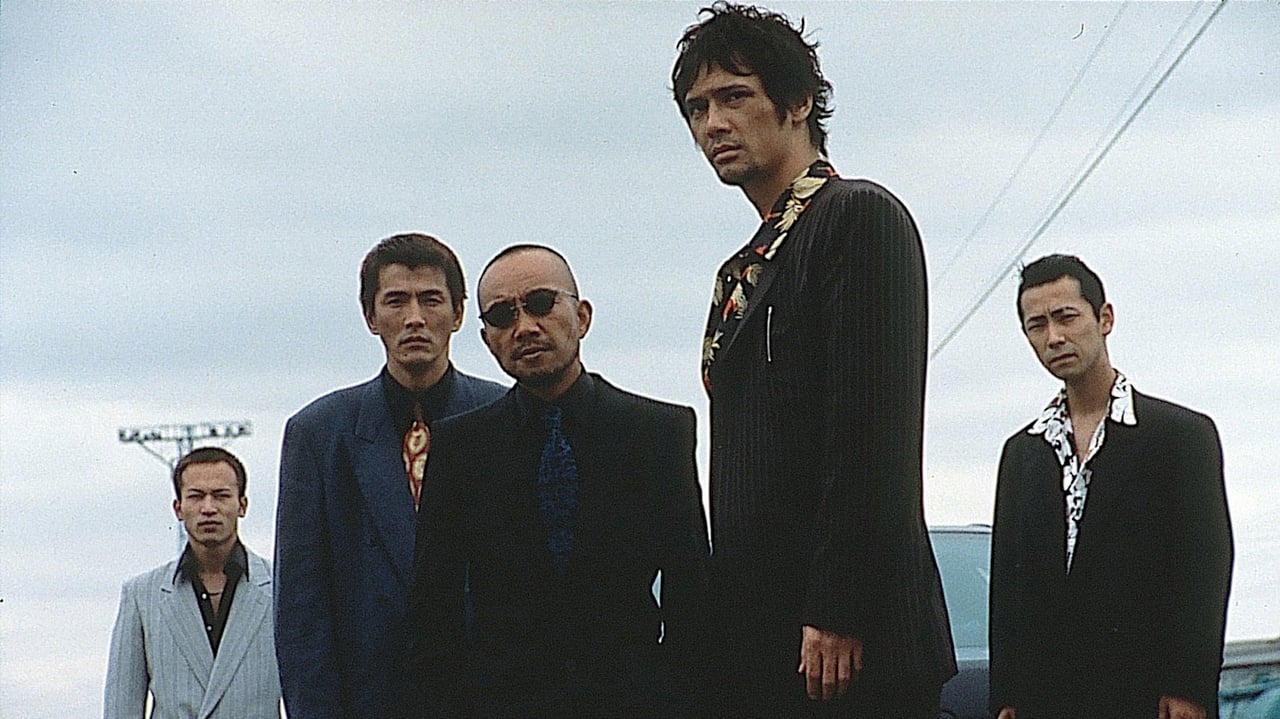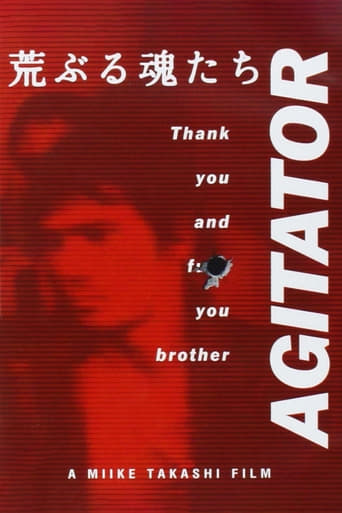

Some things I liked some I did not.
... View MoreI was totally surprised at how great this film.You could feel your paranoia rise as the film went on and as you gradually learned the details of the real situation.
... View MoreIn truth, there is barely enough story here to make a film.
... View MoreGreat example of an old-fashioned, pure-at-heart escapist event movie that doesn't pretend to be anything that it's not and has boat loads of fun being its own ludicrous self.
... View MoreI have already seen many of Miike Takashi's films and I can't find what is really is own style. He has no style of his own, but that doesn't mean he is flat, or uninteresting, far from that. He is like a chameleon, he can give us comedies, horror movies, dramas, thrillers, crime films. And if you watch for instance SHIELD OF STRAW and this one or RAINY DOG, you will never notice anything in common between those three crime flicks. So, I don't even speak if you compare with comedies or ordinary dramas...I will try to get every Miike Takashi film available, even those not in France. This one I comment now is very interesting, the other viewers have done it far better than I should do. The thing I find very offbeat is the music score. It is a sort of French music as we found in eighties French crime features, especially for TV audiences. For instance if you see, one day, some films made for the Series NOIRE TV show, you'll notice this kind of music. Very very strange. Accordion music for a Japanese crime film. Only Miike Takashi can give us this. Maybe a sort of tribute to France from which he was excited by Jean-Pierre Melville, one of his masters. This is finally that the Miike Takashi's style. He has NO style.
... View MoreI ended a week-end of Japan movies with Agitator (others were Drunken Angel, Ikiru, Memoirs of a Geisha, Letters from Iwo Jima, Sky High). Quite a package...From Miike, I had watched Bird People before, which I liked very much. Having checked IMDb and Wikipedia before, I was prepared for yakuza violence. And it sure was delivered - but in a way that keeps me wondering.The (often bloody, then again often quite management-like) power struggles inside the organization make around half of the film. The other half is a mix of seemingly documentary material (with too brief sketches of childhood and romance), giving some impression of what else is in a yakuza's day's work besides shootings. That may even be looking at a flower, or a child playing an electric organ, or spoon-feeding a tied-up prisoner. And such scenes tend to settle deeper in me than yet another blood gusher. The subplot of the noodle-delivery boy being turned into a yakuza apprentice, tattoo and all, was very strong.What surprised me (but then, I'm a Miike newbie) was the total absence of The Law. While in Bollywood movies police is a toothless tiger, but at least cruises around in jeeps sometimes, here it is just non-existent. A bleak world view for a non-yakuza, but still, this is a very thought-provoking movie.
... View MoreAgitator (2001) is one of director Takashi Miike's grittier entries into the Yakuza sub-genre; having far more in common with films such as Shinjuku Triad Society (1996) and Rainy Dog (1997), as opposed to the more colourful likes of Fudoh: The New Generation (1998) and Ichi the Killer (2001). As with the vast majority of Yakuza crime dramas, the issues dealt with here include honour, loyalty, power and betrayal, with Agitator focusing principally on the two conflicting worlds of the Yakuza; with the sharp-suited crime lords doing business behind the closed doors of opulent boardrooms on one side, and the street level thugs who enjoy the giddy rush of excitement provided to them by their criminal existence on the other. As the film progresses the two worlds collide with violent and catastrophic consequences, as Miike reigns in much of his more elaborate directorial flourishes to give us a film that is, for the most part, sharp, realistic and entirely believable.At two and a half hours in length the film is a definite crime epic, however, whereas the implication of such a tag might suggest the grand, operatic elegance of Coppola's The Godfather (1972) or the intricate balance of characters and time presented to us by Scorsese's Goodfellas (1991), Agitator is instead a low-key and entirely low-budget production; focusing on a small collection of reoccurring characters shot through with an unglamorous and unpretentious sense of immediacy. If we compare Agitator to other Miike-directed crime films, from the neo-realist character-piece Ley Lines (1999) to the gonzo deconstruction of the Dead or Alive trilogy (1999-2002), the filmmaker has proved himself again and again to be more than capable of injecting even the most hackneyed and seemingly unoriginal of pot-boilers with a lingering sense of flair, style and imagination. In contrast, the low-key look of Agitator, with its drab colour scheme, real-life locations and use of hand-held cinematography may at first appear jarring, especially to anyone more familiar with his other, more surreal or experimental features, such as Gozu (2003), The Happiness of The Katakuris (2001), Visitor Q (2001) and his masterpiece Audition (1999).This contrast works surprisingly well though, taking a story and a theme that could have become very clichéd and melodramatic and instead, turning it into a very gritty, very human expose into the back-stabbing world of the Japanese Yakuza, and the careful play of power that takes place to create not only harmony, but also supremacy. The basic plot riffs on the various themes discussed above, with honour, loyalty, power and betrayal driving the story, while later we see the prevalent Yakuza themes of revenge and retribution as the film nears its brutal, blood-soaked final. For me, it lacks some of the individuality and sense of imagination found in my favourite Miike films, such as Gozu, Audition, Dead or Alive 2: Birds (2000) and Visitor Q, but at the same time it doesn't feel the need to descend into exaggerated self-parody, like the enjoyable Ichi the Killer or the flawed Dead or Alive: Final (2003). As with Audition and films like The Bird People of China (1998), Rainy Dog and The Great Yokai War (2005) it shows that Miike is a filmmaker more than willing to blend his predilections for excessive violence and gore alongside an interesting story and intelligent characterisation.Agitator, for me, doesn't quite reach the heights of classic Miike. Too much of the narrative seems vague and the epic running time might be a potential drag for some viewers who come to Miike's work expecting endlessly scenes of jaw-dropping spectacle; but that said, there's certainly enough hear to warrant it as a recommendation for viewers who are already vaguely familiar with the filmmaker and his work. As I mentioned earlier, the low key directorial style suits the subject matter very well, creating a film that is gritty and completely believable, while there are some fine performances throughout (including an amusing cameo from the director himself, definitely playing up to his caricatured image as both a misogynist and a sadist), with the cast including a combination of seasoned professionals, Miike-regulars and newcomers with limited experience. Agitator shows us once again that Miike is a real film-making talent able to mix genre films with more personal projects, and able to produce intelligent, engaging and exciting cinema quickly and on a budget.
... View MoreTakashi Miike's reputation as one of the most exciting and innovative directors in the world continues to grow as more of his work becomes available outside Japan on DVD. 2001 was without a doubt a watershed year for him, seeing the release of 'Visitor Q', 'Ichi The Killer' and 'The Happiness Of The Katakuris'. Each one of them was very different in style and content but each in its own way was astonishing. To think that one man could make all three in the same year blows your mind, but when you see he also made OTHERS, well I'm almost speechless... 'Agitator' is one of those other 2001 projects, and (of course) it's nothing like the aforementioned. Viewers who love say 'Fudoh: The New Generation' or 'Ichi The Killer' might find 'Agitator' a bit too slow and conventional, but those who are familiar with any of his moody Shinjuku Triad Society trilogy ('Shinjuku Triad Society', 'Rainy Dog', 'Ley Lines') will feel right at home. The movie is a bit of an epic, dealing with power struggles among crime families after one of their leaders dies, and strongly features themes of loyalty and betrayal. This is familiar Miike territory, but 'Agitator' doesn't include any of surreal interludes or zany ultra-violence of some of his more notorious work, so newcomers should perhaps look elsewhere for a first taste (I suggest 'Fudoh: The New Generation'). However, if like me you are hooked, and are dying to watch any Miike movie you can get your hands on, you won't be disappointed. It may not be as amazing as his three 2001 classics, but it's still a very good movie, solidly directed and well acted.
... View More